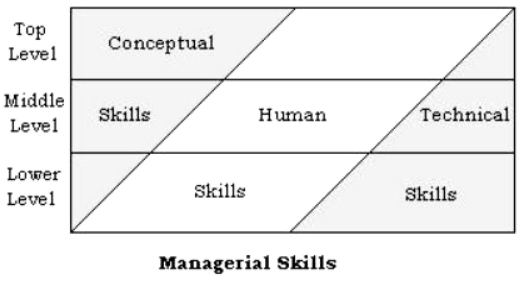UPSC Exam > UPSC Notes > Management Optional Notes for UPSC > Managerial Skills
Managerial Skills | Management Optional Notes for UPSC PDF Download
Managerial Skills Demystified
Not everyone can be a manager. Certain skills, or abilities to translate knowledge into action that results in desired performance, are required to help other employees become more productive.
These skills fall under the following categories:
- Technical Skills:
- Essence: Involves using special knowledge to perform specific tasks.
- Examples: Accountants, engineers, market researchers, and computer scientists.
- Acquisition: Initially gained through formal education, refined through training and job experience.
- Crucial Phase: Most essential at lower management levels.
- Human Skills:
- Core: Demonstrates the ability to collaborate effectively with others.
- Indicators: Seen in fostering trust, enthusiasm, and genuine engagement in interpersonal relationships.
- Managerial Trait: Effective managers possess self-awareness and empathy.
- Development: Natural aptitude or improvement through classes and experience.
- Universal Significance: Critical for all managers due to the highly interpersonal nature of managerial work.
- Conceptual Skills:
- Nature: Involves analytical thinking and problem-solving abilities.
- Capabilities: Breaking down problems, understanding relationships, and recognizing implications.
- Evolution: Initially gained through formal education, further developed through training and job experience.
- Hierarchy Impact: Grows in importance at higher management levels, especially when dealing with ambiguous, long-term consequence problems.

Question for Managerial SkillsTry yourself: Which category of skills is most essential at lower management levels?View Solution
Essential Skills for Managers Simplified
- Technical, Human, and Conceptual Skills:
- Importance Shift: Varies based on managerial responsibility levels.
- Focus on Skill Acquisition:
- Educational Emphasis: Business and management educators aim to cultivate technical, human, and conceptual skills.
- Additional Emphasis: Development of competencies, specialized skills contributing to high managerial performance.
- Key Skills Recommended by AACSB:
- Leadership: Influencing others to perform tasks.
- Self-Objectivity: Realistic self-evaluation.
- Analytic Thinking: Interpreting and explaining patterns in information.
- Behavioral Flexibility: Modifying personal behavior objectively for organizational goals.
- Oral Communication: Clear expression of ideas verbally.
- Written Communication: Clear expression of ideas in writing.
- Personal Impact: Creating a positive impression and instilling confidence.
- Resistance to Stress: Performing well under stressful conditions.
- AACSB's Educational Focus:
- Encouraging Business Schools: To help students develop these skills and characteristics.
- Practical Skills Highlighted:
- Leadership: Influencing others positively.
- Self-Evaluation: Realistic assessment of oneself.
- Analytical Thinking: Understanding and explaining patterns.
- Adaptability: Adjusting behavior for organizational goals.
- Communication Skills: Clear expression verbally and in writing.
- Personal Impact: Building a positive impression.
- Stress Management: Performing effectively under stress.
Question for Managerial SkillsTry yourself: What skill is defined as modifying personal behavior objectively for organizational goals?View Solution
The document Managerial Skills | Management Optional Notes for UPSC is a part of the UPSC Course Management Optional Notes for UPSC.
All you need of UPSC at this link: UPSC
FAQs on Managerial Skills - Management Optional Notes for UPSC
| 1. What are managerial skills? |  |
Ans. Managerial skills refer to the abilities and competencies that managers possess in order to effectively fulfill their roles and responsibilities. These skills include planning, organizing, leading, and controlling, as well as communication, problem-solving, decision-making, and teamwork.
| 2. Why are managerial skills important? |  |
Ans. Managerial skills are important because they enable managers to effectively manage and lead their teams or organizations. These skills help in setting goals, making strategies, guiding and motivating employees, resolving conflicts, making informed decisions, and achieving organizational objectives.
| 3. How can one develop managerial skills? |  |
Ans. One can develop managerial skills through various means. These include gaining practical experience through on-the-job training and working on challenging projects, attending management training programs or workshops, seeking mentorship from experienced managers, reading books and articles on management, and actively seeking feedback and continuously learning from mistakes.
| 4. What are the key components of effective managerial skills? |  |
Ans. The key components of effective managerial skills include:
- Technical skills: The ability to understand and apply specific knowledge and techniques related to a particular field or industry.
- Interpersonal skills: The ability to communicate effectively, build relationships, and collaborate with others.
- Conceptual skills: The ability to analyze and understand complex situations, think strategically, and make informed decisions.
- Leadership skills: The ability to inspire, motivate, and influence others to achieve common goals.
- Problem-solving skills: The ability to identify and address problems or challenges in a systematic and logical manner.
| 5. How do managerial skills differ from leadership skills? |  |
Ans. Managerial skills and leadership skills are closely related but have some differences. Managerial skills primarily focus on the ability to plan, organize, and control resources and processes within an organization. On the other hand, leadership skills primarily focus on the ability to inspire, motivate, and guide individuals or teams towards achieving a common vision or goal. While all managers need some level of leadership skills, not all leaders are necessarily in managerial positions.
Related Searches
















